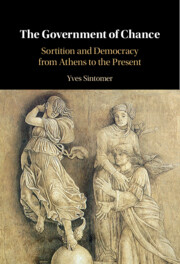 Maurice Pope’s book The Keys to Democracy is the third book ever written advocating the use of sortition as a major component of a modern government. (The two earlier ones being Ernest Callenbach and Michael Phillips’s A Citizen Legislature and John Burnheim’s Is Democracy Possible?, both first published in 1985. Pope, who seems to have started writing at about the same time, was apparently unaware of either.) The great strengths of Pope’s writing are his independence of thought and his evident sincerity. Coming early into the field, and being a classicist rather than a political scientist, Pope was clearly breaking new ground, following his own logical train of thought. He was thus free from the burden of formulaically making connections to prior writings and from the petty-political considerations of self-promotion. This unique situation made a thoroughgoing impact on the book as a whole.
Maurice Pope’s book The Keys to Democracy is the third book ever written advocating the use of sortition as a major component of a modern government. (The two earlier ones being Ernest Callenbach and Michael Phillips’s A Citizen Legislature and John Burnheim’s Is Democracy Possible?, both first published in 1985. Pope, who seems to have started writing at about the same time, was apparently unaware of either.) The great strengths of Pope’s writing are his independence of thought and his evident sincerity. Coming early into the field, and being a classicist rather than a political scientist, Pope was clearly breaking new ground, following his own logical train of thought. He was thus free from the burden of formulaically making connections to prior writings and from the petty-political considerations of self-promotion. This unique situation made a thoroughgoing impact on the book as a whole.
Authors of works about sortition (including Pope) generally share the ostensible aim of achieving some measure of democratization of society. But while this general aim is broadly shared, the consensus ends there because the detailed aims and the proposed mechanisms for achieving them vary widely. At the conservative end, the problem with the existing system is conceived as some sort of sclerosis. The main symptom of the problem is fatigue, or a lack of confidence. Sortition-based institutions are then seen as a way to infuse the system with new blood or new vigor, rejuvenating a system that is essentially sound but has for various reasons, that generally remain vague, fallen into a bad state. Associated with this view of things are generally quite modest proposals – advisory bodies that “help” current decision makers make more informed decisions. Even those more informed decisions are perhaps less important than the mere fact that allotted citizens are widely recognized as having had a part in the process. Indeed, what exactly the problems are with the current outcomes of the process and what are the expected improvements in terms of policy is usually not specified. In fact, sometimes the entire point is to have the allotted citizens themselves become more informed rather than making any changes in decision making. Writings in this vein tend to be heavy with references to the canon of “deliberative democracy” and light on the idea that democracy is a regime of political equality.
Continue reading
Filed under: Academia, Athens, Books, Elections, Fiction, History, Juries, Participation, Press, Sortition | 10 Comments »




 French political scientist Yves Sintomer has published
French political scientist Yves Sintomer has published 
 THE Labour party has again proposed to scrap the House of Lords. This raises the question of what form a replacement House should take, not just in Westminster but also in a potentially independent Scotland.
THE Labour party has again proposed to scrap the House of Lords. This raises the question of what form a replacement House should take, not just in Westminster but also in a potentially independent Scotland.

